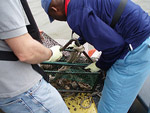
Data of unaffected waters is critical to measuring ecological impact of Deepwater Horizon BP oil spill; agency also determines fishery disaster for Louisiana, Mississippi, and Alabama.
USDA veterinarian warns that boating and fishing enthusiasts should still be vigilant in removing any potential threats from their equipment.
Audubon will use the data as part of its on-the-scene recovery response.
The Shelton Group surveyed 1,312 consumers, and about 13 percent said they will stop buying BP gas.
State expands the net for water crafts to help protect its lakes and ponds from invasive species.
Habitat producers can sign up through April 23 to participate in the first round of rankings for the protection initiative, which will be funneled through the Environmental Quality and Wildlife Habitat incentive programs.
Invasive species responsible in contaminating the popular sport fish, according to a study by the University of Michigan School of Natural Resources and Environment.

UK study says toxic metals may contribute to decline of meat-eating plants such as the endangered white-topped pitcher plant.
Using market-based conservation, the Fort Hood Recovery Credit System pays private landowners for recovery actions because its base is home to the largest known population of the endangered birds.
However, the justification is not as clear for the basis for specific environmental triggers that indicate when water diversions should be reduced.
Under the Lacey Act, pythons and anacondas could be designated as "injurious" and their importation would be prohibited.
The agency will use up to $16 million to reduce threats to the birds, including disease and invasive species and habitat improvement.
Ecosystem Marketplace says properly structured mitigation programs result in creating natural habitat that is larger than the area affected by development and potentially better integrated into the regional ecosystem.
Earthjustice files lawsuit to protect salmon and close loopholes.
Viral hemorrhagic septicemia virus poses threats to fisheries and aquaculture.
Jim McClintock says the increased acidity of the seawater itself can literally begin to eat away at the outer surfaces of shells of existing clams, snails, and other calcified organisms, which could cause species to die outright or become vulnerable to new predators."
University of Maryland and Baylor University ecologists may have discovered a lower ecological "tipping point" at which species are threatened.
The National Academy of Sciences should limit itself to the science of the conservation plan and the environmental needs of the Bay Delta, according to the Environmental Defense Fund.
The $5.5 million will enable the institute and its partners to continue work in western Tanzania for endangered species, including chimpanzees.